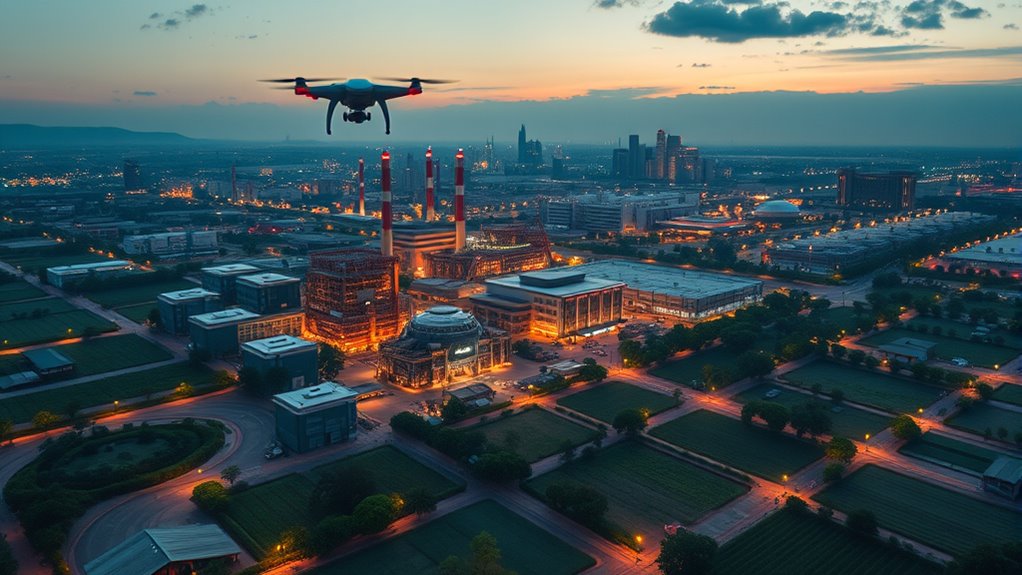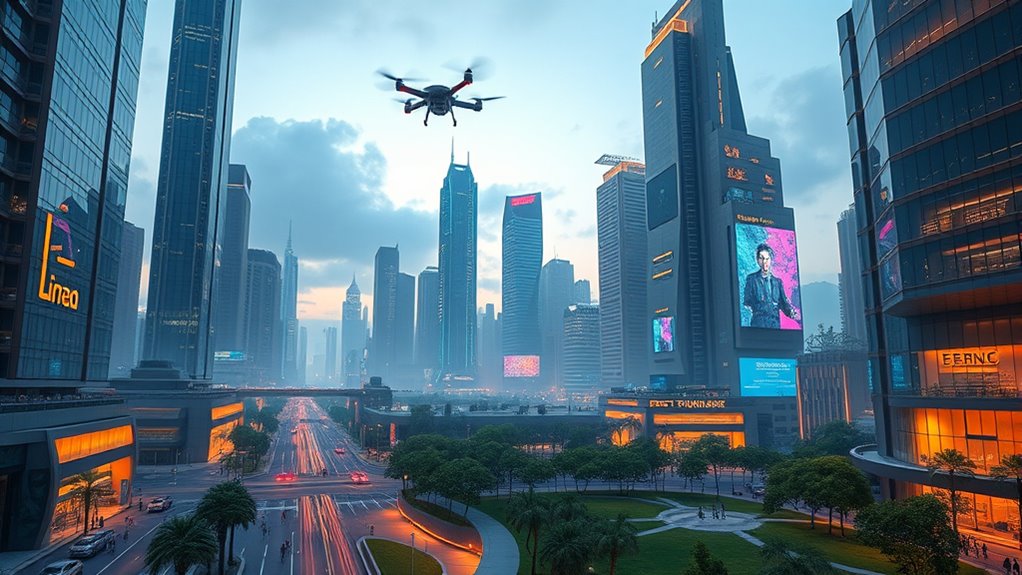A post-work society could either be a utopia or a dystopia, depending on how we manage technological advances and economic shifts. Automation has the potential to free us from mundane tasks and create more leisure and personal growth, but it also risks widening inequalities and social divides if not handled carefully. Social structures, community engagement, and fair wealth distribution will shape whether this new era benefits everyone or deepens societal gaps. If you keep exploring, you’ll learn how these changes might unfold.
Key Takeaways
- Automation may create a utopian society with increased leisure but risks worsening inequality without inclusive redistribution policies.
- Dystopian outcomes include economic disparity, social disintegration, and dependency on technology if risks are unaddressed.
- A post-work society could foster community-focused identities and new social bonds beyond traditional employment.
- Technological advances may lead to greater inequality and social fragmentation if ethical and economic challenges are ignored.
- Balancing innovation with fairness and resilience determines whether the future is utopian, dystopian, or simply different.
Understanding the Foundations of a Post-Work Society

Understanding the foundations of a post-work society requires examining how technological progress has fundamentally transformed the nature of work. As automation advances, traditional jobs become obsolete, especially repetitive and predictable tasks. You’ll see labor demand shift, with machines taking over routine functions. Wealth redistribution becomes essential to manage economic growth from automation while addressing unemployment. Historically, work has been the main way society distributes income, linking survival to employment. Economic crises and technological changes have repeatedly challenged existing work structures, prompting reevaluation. Despite automation, certain tasks—like caregiving and ethical judgments—still need human skills. A post-work society relies on new organizational models, such as Post-Work Organizations, to coordinate remaining human labor. These shifts challenge traditional notions of work’s role in society and economy. Automation’s impact on employment also underscores the importance of developing new social and economic frameworks to support a shifting workforce. Moreover, understanding the technological evolution behind these changes helps anticipate future societal adaptations. Additionally, ongoing developments in AI security highlight the necessity for robust safety measures to mitigate risks associated with advanced automation and AI deployment. Recognizing technological advancements is crucial for designing resilient policies that can adapt to rapid shifts in the job landscape. Furthermore, the integration of personality assessments in workforce planning can help optimize team dynamics and productivity in a post-work environment. Exploring sound design principles can also be valuable in creating immersive virtual environments for future social interactions and workspaces.
The Role of Technology in Transforming Work and Society

Technological advancements are rapidly reshaping the way work is performed and how society functions. Automation is expected to eliminate 29% of jobs by 2030, but also create 13%, leading to significant labor market shifts. AI is transforming roles, with 59% of hiring managers noting its impact on required skills. Technologies like AI, e-commerce, and digital platforms disrupt industries, increasing productivity and consistency. To stay relevant, you’ll need to reskill; over half of employees must undergo significant training soon. Workforce development programs are crucial, helping you adapt to new roles in industries like cybersecurity and big data. Despite ongoing disruption, technological progress can boost economic growth and create jobs, though some sectors face high churn. Staying flexible and acquiring digital skills will be key as society adjusts to these rapid changes. Understanding the evolving labor market is essential for navigating these transformations successfully, especially as automation and AI continue to reshape employment opportunities, which underscores the importance of upskilling and reskilling in today’s economy. Additionally, fostering AI literacy among workers can facilitate smoother transitions and better integration of new technologies into the workforce. Recognizing and leveraging digital skills development can further enhance your ability to adapt effectively to these changes.
Economic Shifts and Redistribution in a Post-Work World

As traditional jobs disappear, you’ll see new ways to distribute wealth that focus on meeting everyone’s basic needs. Automated abundance may lower costs but could also make land and housing more expensive, requiring intentional policies for fairness. To guarantee economic equality, you’ll need systems like universal basic income and community-driven redistribution that adapt to this shift away from wage-based income. Automation’s impact on land prices may exacerbate inequalities if not managed through inclusive policies.
Wealth Redistribution Mechanisms
In a post-work society, wealth redistribution shifts from traditional employment-based methods to innovative mechanisms designed to guarantee economic fairness. You’ll see increased use of progressive taxes on high incomes, estate taxes, and taxes on capital gains and wealth to target concentrated assets. Tax credits and deductions can be expanded to support lower and middle-income groups. Universal Basic Income (UBI) offers unconditional cash transfers to all citizens, reducing bureaucracy and potentially replacing some welfare programs. Social safety nets like unemployment insurance, child benefits, and universal healthcare help address disparities directly. Research shows Worker-owned enterprises and cooperatives promote wealth sharing within workplaces, while land reforms and public investments create fairer access to property and opportunities. These mechanisms aim to distribute wealth more equitably, fostering stability and social cohesion. Additionally, fostering self-awareness around economic disparities can promote more equitable participation in these systems. Incorporating wall organization strategies into community planning can also facilitate better distribution and access to shared resources. Understanding tax policies and their impact on different income groups becomes crucial for maintaining fairness and encouraging participation, especially as new redistribution methods are implemented. Moreover, evaluating the power consumption of various economic initiatives can help ensure that these systems remain sustainable and energy-efficient.
Impact on Economic Equality
Economic inequality in a post-work society continues to evolve, influenced by existing trends and new structural shifts. You’ll notice pre-tax and transfer income gaps widening in post-industrial democracies, driven by changes in labor markets and social demographics like more single-parent households. Structural unemployment, especially among youth, worsens income disparities, while regions with strong education investments, like Nordic countries, help mitigate inequality. Technological advancements, such as AI and automation, threaten to displace jobs, deepening divides between resource-rich and resource-poor groups. The gig economy and unstable employment further weaken the link between work and income. Without targeted redistributive policies and inclusive access to education and technology, economic inequality risks intensifying, potentially deepening societal divisions in a post-work future. Additionally, vetted initiatives like accessible quality dog sweaters, nutritious dog meals, comfortable dog beds, and thoughtful gifts for dog lovers highlight the importance of community and shared interests in navigating societal changes.
Changing Perspectives on Meaningful Engagement and Leisure

Changing perspectives on meaningful engagement and leisure reflect a shift from viewing work and leisure as oppositional to recognizing them as interconnected aspects of life. You now see leisure not just as downtime but as an extension of identity and purpose. This evolution highlights that:
- Creative workers blend work and leisure, pursuing fulfilling projects without strict boundaries.
- Access to meaningful activities depends on skills, education, and social networks, which can exclude many.
- Technology blurs work and leisure boundaries, enabling flexible engagement and new forms of leisure like gaming and online communities.
- Research shows that leisure activities can significantly contribute to mental health and overall life satisfaction, emphasizing their importance beyond mere relaxation.
This shift fosters a broader view where leisure offers psychological and social rewards, and work can be a source of personal fulfillment. It encourages you to find purpose beyond traditional employment, shaping a more integrated and meaningful lifestyle.
Social Dynamics and Community in a Post-Work Era

As work no longer defines your social identity, you might find community and belonging shifting to new forms beyond employment. You could be part of online groups, local initiatives, or shared interests that replace traditional workplace connections. This change challenges how society organizes itself and creates fresh opportunities for social engagement. You might also see the emergence of alternative social structures that facilitate connection outside conventional job-based networks. Work as a basis for social bonds may diminish, leading to new ways for individuals to find meaning and connection outside of traditional work roles. Additionally, the decrease in formal employment could encourage the growth of informal social networks, fostering diverse and flexible community interactions. These evolving social frameworks could incorporate digital communities, further transforming how individuals connect and collaborate in a post-work society.
Community Engagement Shifts
In a post-work society, traditional community structures are evolving as people spend less time engaged in formal employment. This shift impacts how communities form and stay connected. You’ll notice that:
- Only 23% of workers worldwide feel engaged at work, prompting the need for new social hubs.
- Community activity rates hover around just 15%, showing that many remain inactive without targeted strategies.
- Work hours often limit social interaction, weakening community bonds beyond the workplace.
As a result, communities are turning to diverse activities and virtual platforms to boost engagement. Online hubs, volunteer initiatives, and inclusive events help bridge gaps created by changing work patterns. You’ll find that adapting these strategies strengthens social ties in a post-work world.
Redefining Social Roles
The shift to a post-work society prompts a fundamental reevaluation of social roles and community dynamics. You’ll need to redefine your place in society, moving beyond traditional employment to focus on social contributions. As unpaid work like housework and caregiving gains recognition, the value of these roles becomes clearer. Gender biases in unpaid labor highlight existing inequalities, urging a more equitable approach. Social organizations may emerge to prioritize socially valuable work regardless of pay, shifting economic metrics to include unpaid efforts. Your community roles could transform from job-based identities to roles centered on fostering connections and supporting others. This evolution encourages you to see yourself as a crucial part of a community, emphasizing shared responsibility and collective well-being.
| Social Role | Community Focus | Key Challenge |
|---|---|---|
| Caregiver | Supporting families | Gender bias in unpaid labor |
| Volunteer | Building community | Revaluing unpaid contributions |
| Organizer | Facilitating social bonds | Maintaining equity in social capital |
| Mentor | Guiding others | Redefining identity beyond work |
| Facilitator | Strengthening communal ties | Addressing social disparities |
Challenges, Concerns, and Ethical Questions

Challenges, concerns, and ethical questions in the post-work society highlight complex issues that impact both workers and organizations. You face a skills gap, where rapid technological changes leave many unprepared, risking increased unemployment and inequality. Job market volatility can cause frustration and instability, while retention issues threaten organizational continuity. Consider these key concerns:
- Fair Compensation: Wage disparities, especially in nonprofits, raise ethical questions about fairness and equity.
- Work-Life Balance: Blurred boundaries can harm mental health and reduce productivity.
- Trust and Well-being: Declining trust in institutions and economic pressures worsen workplace stress and mental health challenges.
Addressing these issues requires balancing technological progress with ethical commitments, ensuring fairness, and fostering resilience in an evolving landscape.
Organizational Changes and New Models for Human Collaboration

As organizations adapt to a post-work society, they are embracing transformative changes that redefine collaboration and work structures. You’ll see increased integration of AI and automation to streamline tasks, reducing manual effort and boosting efficiency. Decentralized workforces, especially remote and flexible arrangements, allow teams to adapt quickly and work from anywhere. Job redesign emphasizes skills that are less automatable, encouraging voluntary participation based on personal interest. New models like cooperative workspaces foster innovation through shared environments, while virtual teams enable collaboration across borders. Workplace democracy grants employees more influence in decision-making. Community-based projects focus on collective needs rather than profit. These shifts promote a more inclusive, adaptable, and creative environment, transforming traditional hierarchies into dynamic, collaborative ecosystems suited for a post-work world.

How can we effectively navigate the uncertainties of a post-work society, where economic shifts and technological advancements create both risks and opportunities? First, recognize that the shift to a service economy and automation reduces traditional jobs, but also opens new avenues for innovation. Second, focus on developing skills in technology and adaptability to stay relevant amid global market pressures and changing workforce demands. Third, consider policies that invest in workers, balancing productivity with social well-being, to mitigate inequality and social isolation. By embracing lifelong learning, fostering inclusive policies, and promoting economic models that value well-being, you can turn risks into opportunities for growth and resilience in this evolving landscape.
Visions of the Future: Utopian Possibilities and Dystopian Risks

The future of a post-work society holds both promising utopian visions and alarming dystopian risks, driven largely by technological advancements. Automation and AI could free you from mundane tasks, allowing more time for creativity and personal growth. Technology might connect you globally, offering diverse work opportunities and fostering societal progress, as seen with innovations like library automation improving access. However, risks loom; inequality could worsen, leading to social disintegration. Literature warns of potential dependency on tech, inefficiencies, and unforeseen consequences. While efficiency and innovation are possible, over-reliance on technology might threaten resilience. Balancing these prospects requires addressing economic shifts, ensuring social equity, and managing environmental impacts, shaping a future where technological progress benefits everyone—or deepens societal divides.
Preparing for a Society Beyond Traditional Employment

Advancements in technology and shifting economic patterns are reshaping the future of work, prompting society to prepare for a post-employment era. You’ll need to adapt by focusing on new skills, organizational models, and policies. Consider these key steps:
- Develop human-centered skills like resilience, empathy, and leadership that remain valuable even as automation increases.
- Support the shift to post-work organizations (PWOs), which coordinate residual work and community engagement beyond traditional jobs.
- Advocate for policies that address income distribution and social stability, ensuring everyone benefits from economic shifts.
Frequently Asked Questions
How Will Income Inequality Be Addressed in a Post-Work Society?
You’ll see income inequality addressed through policies like universal basic income, social welfare, and affordable housing, ensuring everyone’s basic needs are met. You’ll also benefit from improved access to education, healthcare, and job training, reducing systemic barriers. Community initiatives and cooperative models will empower you to participate in decision-making, fostering fairness. These measures aim to create a more equitable society, even as traditional work roles evolve or diminish.
What Types of Jobs or Roles Will Remain for Humans?
Think of human roles like a lighthouse guiding ships through fog—you’ll still be essential. In a future society, jobs requiring empathy, creativity, and complex problem-solving will stay crucial. You’ll find opportunities in social services, education, community leadership, craftsmanship, and repair work. Your human touch remains irreplaceable in roles that need understanding and connection, ensuring society stays compassionate and vibrant even as automation transforms other industries.
How Can Societies Ensure Ethical Use of AI and Automation?
You can guarantee ethical AI use by establishing clear internal guidelines that prioritize data privacy, bias prevention, and accountability. Form ethics committees to enforce standards, and train staff on ethical practices. Incorporate transparency, diverse datasets, and human oversight throughout AI development. Regular audits and feedback mechanisms help identify issues early, while collaboration with experts ensures your organization stays aligned with evolving legal and ethical norms. Prioritizing these steps protects societal interests and fosters responsible AI innovation.
What Are the Potential Mental Health Impacts of Reduced Work?
Imagine a tightrope walker balancing carefully—reduced work hours can lessen your mental load, easing stress and boosting well-being. With more time for hobbies and rest, you may find your mind clearer and more creative. Yet, if finances falter or purpose fades, anxiety could creep in. Supportive policies and social connections act as safety nets, helping you navigate the delicate balance for better mental health.
How Will Education Systems Adapt to Prepare for Post-Work Skills?
You’re wondering how education systems will adapt to teach post-work skills. They’ll focus on flexible, learner-centered experiences that emphasize practical, real-world skills aligned with evolving workforce needs. Expect more inclusive pathways for diverse learners, increased work-based learning like apprenticeships, and integration of technology such as AI. Schools will prioritize career exploration and technical training, helping you develop adaptable skills that prepare you for a world where traditional work may change or diminish.
Conclusion
As you consider the future, remember that experts predict over 47% of jobs could be automated within the next two decades. This shift offers both risks and opportunities—potential for greater leisure, creativity, and community, or challenges like inequality and loss of purpose. Embracing change now helps you navigate this evolving landscape, shaping a society that values meaningful engagement beyond traditional work. The future is yours to influence—are you ready to imagine it?









